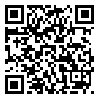Volume 14, Issue 1 (2024)
ORMR 2024, 14(1): 109-128 |
Back to browse issues page
Download citation:
BibTeX | RIS | EndNote | Medlars | ProCite | Reference Manager | RefWorks
Send citation to:



BibTeX | RIS | EndNote | Medlars | ProCite | Reference Manager | RefWorks
Send citation to:
Zare H, bahonar F. Identifying and categorizing organization muda with an emphasis on lean thinking in a metacombination method. ORMR 2024; 14 (1) :109-128
URL: http://ormr.modares.ac.ir/article-28-71759-en.html
URL: http://ormr.modares.ac.ir/article-28-71759-en.html
1- Associate Professor, Department of Management, Faculty of Management and Accounting, College of Farabi, University of Tehran, Tehran, Iran. , hzarea@ut.ac.ir
2- Phd student of human resources management, Faculty of Management and Accounting, College of Farabi, University of Tehran, Tehran, Iran.
2- Phd student of human resources management, Faculty of Management and Accounting, College of Farabi, University of Tehran, Tehran, Iran.
Abstract: (496 Views)
Muda is essentially the antithesis of productivity, referring to anything that causes organizational resource wastage. Organizational resource wastage not only leads to inefficiencies within organizations but also imposes additional burdens and hinders organizational efforts towards productivity. The aim of this research has been to take a step towards reducing waste and resource loss by identifying and categorizing organizational muda. To achieve this, the meta-synthesis method was employed. The initial sample consisted of 90 relevant studies extracted from databases such as Emerald, Elsevier, sciencDirect, Springer, and Wiley. After screening the studies for various criteria including title, abstract, content, and quality, 26 studies remained, the results of which were synthesized. The outcome of this process yielded 65 components of organizational muda, categorized into four groups: individual, organizational, managerial, and occupational factors. Therefore, this study provides a classified understanding of organizational muda for managers to effectively manage these wasteful factors and enhance the productivity of their organizations.
Article Type: Qualitative Research |
Subject:
Organizational Behavior and Human Resource Management
Received: 2023/09/29 | Accepted: 2024/03/16 | Published: 2024/06/30
Received: 2023/09/29 | Accepted: 2024/03/16 | Published: 2024/06/30
Send email to the article author
| Rights and permissions | |
 |
This work is licensed under a Creative Commons Attribution-NonCommercial 4.0 International License. |






